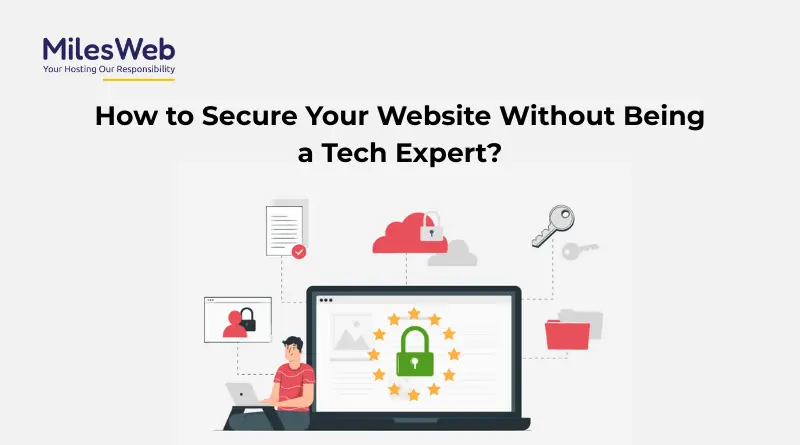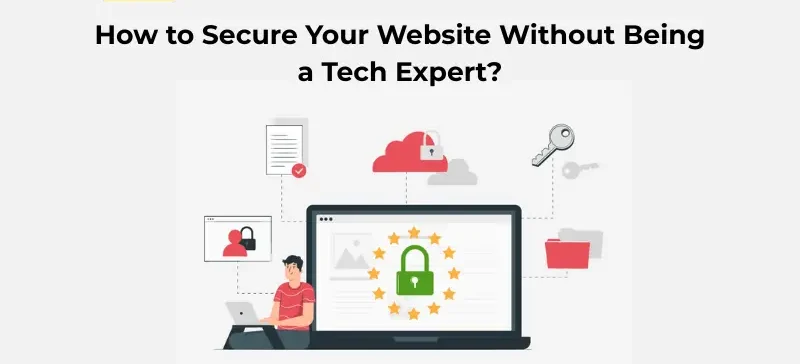There is no need to be a cybersecurity expert or a genius to secure the website. However, it is a necessity; it is not rocket science to shield the data. In this context we talked about how to secure your website without being a tech expert.
Whether you are a small blogger, business owner, or someone running a personal portfolio website, a secure website builds a brand reputation among visitors—even when built with cheap domain and hosting solutions.
Fortunately, there are quick and effective safeguards that can enhance your website security without any technical skills. With the right tools (that you can utilize with basic knowledge) and lots of little steps forward, you can set yourself up to minimize risks and influence hackers to go elsewhere—even if you plan to move website free from one host to another. Here are a few easy actions that anyone can take – no code, no website expertise, and no complicated technical skills needed.
How to Secure Your Website Without Being a Tech Expert?
1. Use Strong, Unique Passwords
Cracking a weak password is not rocket science for hackers. Passwords are the first line of defense. So, avoid easy combinations like “123456” or “abc123.” Instead, create a strong password with unique and special characters for your email account, website control panel, and client area.
Take the help of password manager tools like LastPass or Bitwarden to generate complicated passwords. These tools take the burden off memory while ensuring the credentials are harder for hackers to crack or guess.
2. Keep Your Software and Plugins Updated
Content Management Systems (CMS) like WordPress, Joomla, or Magento heavily depend on regular updates to fix bugs, improve functionality, and, importantly, patch security vulnerabilities. The same principle applies to themes and plugins. Hackers often scan for outdated websites that are vulnerable to cyber threats. If you are running an older version of the tools, you are on an easy target.
Fortunately, these days, most platforms have automatic updates or at least have functionality to alert you of updates that are available. Once a week, make it part of your routine to log in to your admin dashboard and check for and update everything. You do not need to understand the code behind any of these tools. All you have to do is click “update”, and you will immediately enhance the security of your website.
3. Install an SSL Certificate
An SSL certificate encrypts sensitive data transfer between the website and visitors. It is available for free with the web hosting plan. Suppose your website has sensitive information like login details, contact forms, and payment information. An SSL certificate is what changes your site’s URL from “http” to “https” and displays the padlock icon in the browser, boosting both your credibility and your ranking on search engines like Google.
A large number of hosting providers offer free SSL Certificates through Let’s Encrypt or offer them as part of a hosting plan. To set up, you can typically just click a few buttons in your hosting account. Once installed, SSL protects your users, but it also provides a more professional (and trustworthy) appearance to your website. Even if you’re not dealing with payment, SSL is basically essential for today’s Internet.
4. Use a Security Plugin or Tool
There is no need to outsource an external team or expertise to monitor your website. Security plugins of websites perform the same task. Tools like Sucuri or SiteLock offer real-time protection by scanning the website for malware. Also, these tools block suspicious traffic and alert to the real potential threats. These plugins are designed with non-tech users in mind, often offering simple dashboards and guided setup wizards.
It’s just a matter of a few clicks and activations for firewall and login attempt limits, and then you can set automated scans. Once installed, many plugins also give you performance tuning and backup capabilities, providing an all-in-one solution for site and performance task automation. Consider them as your invisible bodyguards – always watching and caring for your website in the background.
Also Read
5. Enable Two-Factor Authentication (2FA)
Passwords themselves can’t ensure 100% security. If a third person is managing your password, they may steal it. Two-factor authentication (2FA) builds a second barrier that is better than harder to get through. By enabling 2FA, logging into the website requires both your password and a temporary code sent to your email or phone or generated through an app like Google Authenticator.
Setting up 2FA is easier than you think. Most major CMS platforms and hosting services offer this use in their security settings or through a third-party plugin. Once you have it set up, it becomes an incredibly useful layer of security without being too much additional headache every time you log in. It is a minimal amount of effort for an extra layer of protection.
Summing Up
Website security doesn’t have to be intimidating. With just a few easy-to-understand steps, you can take control of your site’s safety and protect both your content and your visitors. You don’t need to write a single line of code; just adopt these good habits and let the right tools do the heavy lifting.
By using strong passwords, keeping your software updated, enabling SSL, installing security plugins, turning on 2FA, and backing up regularly, you’ll be covering all the essential bases. It’s about being proactive, not perfect. With consistent effort, you can create a secure online space, even without being a tech expert.





